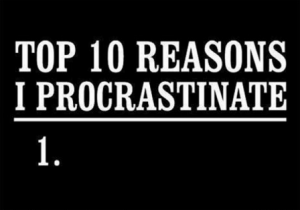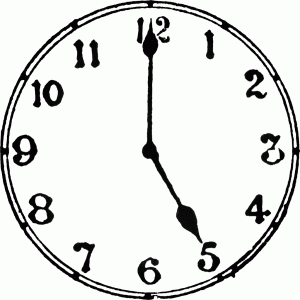On second thought, it can wait ’til later
By Phuong Nguyen
“Procrastination is like a credit card. It’s a lot of fun until you get the bill.”
— Christopher Parker
It was 12 a.m. on a cold December night. In a small dark room in the basement of Bryn Mawr College’s Erdman dormitory and Tran has been staring at the blank Word Document for two hours.
Her heart was beating fast. Her greasy 3rd-day hair was tied up in a messy potato-like bun. Clothes and papers were scattered over the floor. Banana peels and a dining hall take-out box with half of the pizza left sat sadly in the corner of the room.
After spending the whole week finishing season one of Gossip Girl on Netflix, sending tons of snapchats, texting endlessly with her friends about the fact that she was not doing anything, scrolling over and over and remembering every new story on all social media pages, Linh Tran ‘17 finally ran out of ways to procrastinate and found herself stuck, panicking and mentally dying over the five-page paper that was due in nine hours.
The majority of college students would share the “been there, done that” sympathy with Tran’s situation.
Procrastinating 101
According to a research, procrastination has more than quadrupled in the last 30 years while another suggests that 85-95% of students have problems associated with procrastination.
“I think everybody procrastinates, just at different levels and procrastination is actually very contagious,” said Stephanie Cao, a Bryn Mawr sophomore. “When my friend sitting next to me chooses to go on Yik Yak over writing her paper, I can continue watching makeup tutorials on YouTube instead of studying without feeling guilty.”
Adds Mai Hoang, a freshman:“I procrastinate so much that now I accept that procrastinating is a part of the process. When I plan for doing an assignment, I set aside a few hours for doing nothing before I actually get down to it.”
Walking around the library at night in finals week, it’s not hard to spot the Facebook logo on some computer screens, catch some people glued to their phones or see a group of procrastinators with tired faces complaining about work instead of doing work in a corner.
If procrastination is a subject, most college students should all get A for their unlimited creativity for ideas how to delay doing work.
Yinlu Gong, a sophomore, was very excited to talk about her most favorite distractor of all time – Hay Day game on her iPhone.
“I always started promising myself I will just log in for five minutes and harvest what I planted the previous day,” she confessed. “But most of the time I ended up spending hours working on how many more cows and vegetables I need in order to earn the most money as a farmer, instead of doing my microeconomics problem set on profit maximization.”
Some other nominees for the best procrastinating idea award include: “practicing my autograph believing I’ll need it when I’m famous”, “stalking Facebook of my primary-school friends to see who gained weight”, “scrolling through 50 pages of Forever 21 new arrivals and adding tons to shopping cart but never actually buying anything”, “going through every single picture in the camera roll and feeling nostalgic about the time when I don’t have a deadline”, etc.
Procrastination’s consequences, however, are not fun at all.
Freshman Mai Hoang admitted “I become anxious so badly when the deadline comes closer and that decreases the quality of my work a lot. I really want to cure my procrastinating habit, but I don’t know how.”
A recent research with a sample size of 374 undergraduates found that students who put things off were more likely to eat poorly, sleep less and drink more than students who do things promptly.
Out of 2,700 responses to the question “To what extent is procrastination having a negative impact on your happiness” in an online survey by The Procrastination Research Group, 46% said “very much” or “quite a bit”, while 18% chose “extreme negative effect.”
The World of Procrastinators
Although distraction directly causes procrastination, researchers found out that the root cause of procrastination has a lot to do with human’s psychology.
Based on the psychological motivation to procrastinate, there are three kinds of procrastinators: the Thrill Seeker, the Avoider and the Perfectionist.
The Thrill Seekers, or also known as the stress lovers, are people who love the last-minute rush and work better under the time pressure. Procrastinators of this type often have strong confidence in their ability to produce quality work. Deadlines are actually their best friends, unlike nightmares for the majority.
“When I’m under pressure, there is an invisible power pushing me to focus so well that my thinking flows smoothly and every problem becomes solvable,” said Sophomore Christina Schmidt. “My experience has shown that brilliant ideas only come some hours before the deadline. Therefore, I don’t even bother to get started days before. You just need to wait  for the moment to come, you know.”
for the moment to come, you know.”
“It’s just really thrilling. I feel like I’m on a race rushing to the destination and it gets me so excited, confessed Sophomore Tina Chen.“Every time when I manage to submit something just in time, like 11:58 p.m. for the 12:00 a.m. deadline, I feel very satisfied afterward. Like I just won something and I can do anything, seriously
The majority of procrastinators, however, seem to belong to the second category: The Avoider.
According to Blogger Mark Manson, “Procrastination, when not rooted in some petty displeasure, when debilitating and life-destroying and hair-greying in its intensity, is always rooted in some form of fear.”
When asked if there is any fear underlying their putting off work, many contemplated for a while and eventually admitted yes.
“I have never really thought about it but it seems like I can’t start writing that paper cause I have such a strong pressure that I have always been a good writer and that paper needs to be as good as any other papers I have ever written,” said Sophomore Stephanie Cao. “I’m scared of screwing up, then I decided to avoid it.”
Cao added: “In my freshman year I had small conflicts with my roommates. However, I put off talking to her about it because I feared it would ruin our relationship… until it actually did, as a result of my procrastination to resolve the conflicts and let them build up.”
Like Cao, The Avoiders share the same characteristics: weak confidence in doing good work, fear of failure and huge concern about what other people think about them.
The biggest issue with The Avoiders, according to the psychologists, is that their fears are often unconscious and thus impossible for them to get rid of in order to get their things done.
Lastly, the third type of procrastinators is The Perfectionist, also known as the Indecisive.
These people always get stressed very easily, want all their work to be perfect and are scared of making decision.
Junior Alex Nguyen said “I have a trouble with always doubting if I’m doing something the best way it can be. I feel like the time I spend weighing up pros and cons of options to finally decide one is actually enough for me to just do it.”
Another perfectionist, Sophomore Grace Tang, experienced procrastination slightly differently
“I have the tendency to set unreachable goals for myself, like reviewing five chapters of Calculus and write one paper in a night,” she said. “As I get started and feel overwhelmed by the volume of the work, I become demotivated, eventually give up on the whole plan and do nothing instead.”
When the deadline approaches, unlike The Avoiders who will take shortcuts or do whatever just for the sake of getting things done to escape the fear of failure, The Perfectionist go through high anxiety and stress to make sure the quality of their work is perfect.
The World of Non-Procrastinators
This world might be much smaller. But it does exist. The world of people who don’t procrastinate.
These people can also be categorized in two groups: The Unfortunate Stress Haters and The Fighters.
The Unfortunate Stress Hater ironically hate stress so much that they are stressed about getting stressed and actually motivated to get work done by the stress.
As Fiona Redmond, a sophomore, explained: “I’m very paranoid about not getting work done. Even when I have written 9 out of 10 pages I need to write, I still feel like I’m so nervous. If I don’t get my stuffs done at least 3 days before it’s due, I will question myself what I am even doing and feel like I’m failing.”
The Fighters, however, belong to this world because they actually use helpful techniques to fight and win procrastination.
 Thuy Tran, a freshman, shared her tips: “I try to create an environment when it’s harder to not do something than do it. I put all of possible sources of distraction out of my view by studying alone and putting my phone in airplane mode. The important thing is I start from the easiest things. When you start crossing off bullets on your to-do list, you start having a sense of productivity and have more motivation to do harder tasks.”
Thuy Tran, a freshman, shared her tips: “I try to create an environment when it’s harder to not do something than do it. I put all of possible sources of distraction out of my view by studying alone and putting my phone in airplane mode. The important thing is I start from the easiest things. When you start crossing off bullets on your to-do list, you start having a sense of productivity and have more motivation to do harder tasks.”
Tran’s favorite quote is “Action is both the cause of motivation as well as the effect of motivation.”
Previously being an Avoider, Linh Nguyen, another Fighter, now focuses heavily on how to solve the root causes of procrastination – the fear. As she explained it: “I feel like the more I care about the outcome, the harder it feels to achieve. When I pressure myself that I’m a good student and needs to do everything great, I have such a strong desire to avoid doing anything that might threaten that identity of mine.”
“So what I suggest is to try to view yourself in a simple and broad way, like “I’m a student who is writing a paper” instead of “I’m a genius writer who always gets a 4.0 and the paper I’m writing must be nothing but 4.0”, even though in fact you actually are.”
As a Buddhist, Linh also found the No Self technique very helpful to cure procrastination. She explained that when one lets go of the concept that she even exists, she will prevent the avoidance, the fear and the procrastination that come with the threat of the own identity she choose for herself.
The Fighter concluded “Procrastination happens to everyone. It’s important that you dig deep into the root cause of your feelings and find a way to overcome your psychological barriers. Only by doing that can you reach to your own highest level of productivity and produce best work in your ability”
Tick tock. Tick tock.
It was 5 a.m. and Tran was on the first line of the 4th page. She tried to calm herself down  by reasoning that she still had four more hours to write two pages. The warning of her professor on the first day he assigned the prompt suddenly came back to her: “Please, do not wait until the last minute. This is not an easy one. And you don’t want to burn your whole semester’s effort by screwing up this time.”
by reasoning that she still had four more hours to write two pages. The warning of her professor on the first day he assigned the prompt suddenly came back to her: “Please, do not wait until the last minute. This is not an easy one. And you don’t want to burn your whole semester’s effort by screwing up this time.”
“Oh My God why I’m doing this to myself?” Tran held her face to the desk, helplessly looking at the messy bunch of notes all over the place.
She doesn’t even remember how many times, in a situation like this, she promised herself she would change and get everything done early the next time.
“No, this time, I think I had had enough. I’m sick of the cycle of anxiety and stress that I don’t deserve.”
The dawn was getting brighter.
Maybe the time has come. The time for Tran to wake up, learn how to become a Fighter and move to the new planet, the planet of Non-Procrastinators.
Or maybe not yet.
